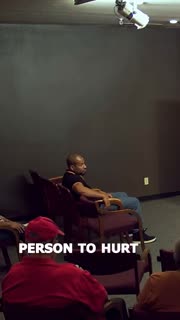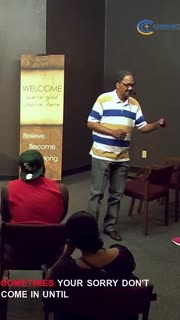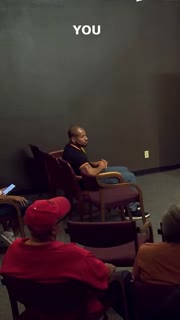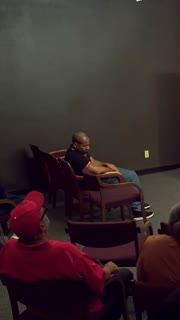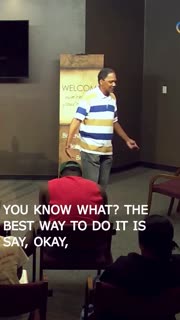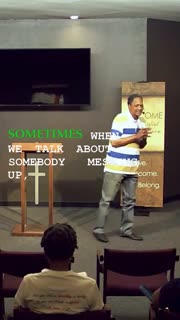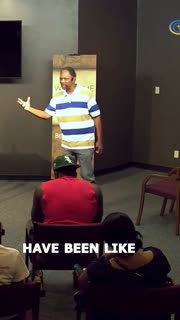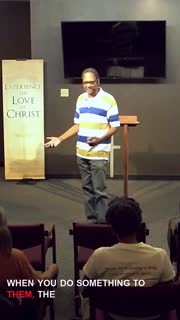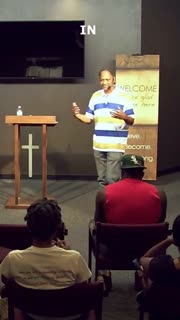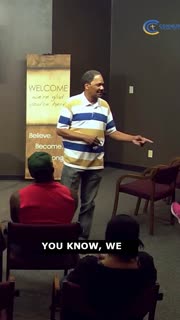Embracing Accountability and Forgiveness in Relationships
Devotional
Sermon Summary
Bible Study Guide
Sermon Clips
### Quotes for Outreach
1. "The easiest person to hurt is the one that expects the most out of you. So the one that expects the most out of you is family. So the easiest person to hurt is family. Think about it. When you hurt them, saying I'm sorry, even when you know you're wrong, it's like Linda said, well, you know my intentions. You know what I mean. But think about it. Even though if I know your intentions, you still need to say what? I'm sorry." [08:17] (27 seconds)
2. "Sometimes your sorry don't come in until you have the same pain that your sorry caused. Sometimes your sorry don't come in until you have the same pain that your sorry caused. So when you start, when you feel, when you feel the hurt that your sorry caused, then you want to say, I'm sorry. Because now you know what it feels like." [26:47] (27 seconds)
3. "Christ saw you before you even did it. Christ knew your heart. So Christ even knew your intentions when you did it. But then when you came and said, I'm sorry, you asked for forgiveness. What did he say? What did Christ do when you asked for forgiveness? He forgave you. And think about it. He didn't bring it back up to you either, did he? Unconditional. Unconditional. He did not bring it back up to you." [43:40] (22 seconds)
4. "Because you know what happens when you hold on to something for so long, it puts a weight on you. It puts a weight on you and that's why you can't move forward because that weight is keeping you in that same spot. That weight keep you in that same spot, so that's why you can never move away from that." [01:09:36] (106 seconds)
5. "You know what? The best way to do it is say, okay, you know what? If you did something and you keep on doing it, okay, that's on you. That's between you and God. I'm gone. I'm moving on. So if you want to act that way, you want to think that way, you want to be that, that's fine. That's you. I'm not going to react to something that's holding you back." [01:10:05] (20 seconds)
### Quotes for Members
1. "Sometimes when we talk about somebody messing up, we always look at one aspect of it. We always look at one aspect of somebody messing up, having to say I'm sorry. But when we look at 2 Samuel chapter 11, this is the story about David and Bathsheba." [08:17] (17 seconds)
2. "If David would have been like Uriah, he would have been out there fighting. But Uriah, this is how I ain't doing this. Y'all know. So, he got up there. And so, what they did, they put Uriah in the front lines. Then the word came back and talked about all the people that got killed. He said, and Uriah got killed." [24:15] (19 seconds)
3. "When you do something to them, the sorrow should, the sorrow should be greater. So when David felt the pain that, that, that, what he put Uriah through, not even Uriah, but Bathsheba, what he put her through, then he said, you know what? I done messed up. know what? You know what? You're not going to say I'm sorry until you realize how bad you messed up. Then how bad you made somebody else feel because of what you did." [28:34] (26 seconds)
4. "You can create up some injustice in your mind. It never happens in your reality. But in your mind, you treat that injustice like it's real. And then you think about it, they're insecure or they're doing the same thing or doing something worse. And they want to keep that from you. It's almost like, you know, you did me this way. I'm going to do, I'm going to get you back. That get back thing is what, that get back is always the one that does the worst." [33:19] (27 seconds)
5. "I'm talking about forgiveness. You know, we know some people just practice to be a good person. We practice to be Christians. We practice to be, we practice to be like Christ." [01:06:03] (9 seconds)
Ask a question about this sermon
1. "The easiest person to hurt is the one that expects the most out of you. So the one that expects the most out of you is family. So the easiest person to hurt is family. Think about it. When you hurt them, saying I'm sorry, even when you know you're wrong, it's like Linda said, well, you know my intentions. You know what I mean. But think about it. Even though if I know your intentions, you still need to say what? I'm sorry." [08:17] (27 seconds)
2. "Sometimes your sorry don't come in until you have the same pain that your sorry caused. Sometimes your sorry don't come in until you have the same pain that your sorry caused. So when you start, when you feel, when you feel the hurt that your sorry caused, then you want to say, I'm sorry. Because now you know what it feels like." [26:47] (27 seconds)
3. "Christ saw you before you even did it. Christ knew your heart. So Christ even knew your intentions when you did it. But then when you came and said, I'm sorry, you asked for forgiveness. What did he say? What did Christ do when you asked for forgiveness? He forgave you. And think about it. He didn't bring it back up to you either, did he? Unconditional. Unconditional. He did not bring it back up to you." [43:40] (22 seconds)
4. "Because you know what happens when you hold on to something for so long, it puts a weight on you. It puts a weight on you and that's why you can't move forward because that weight is keeping you in that same spot. That weight keep you in that same spot, so that's why you can never move away from that." [01:09:36] (106 seconds)
5. "You know what? The best way to do it is say, okay, you know what? If you did something and you keep on doing it, okay, that's on you. That's between you and God. I'm gone. I'm moving on. So if you want to act that way, you want to think that way, you want to be that, that's fine. That's you. I'm not going to react to something that's holding you back." [01:10:05] (20 seconds)
### Quotes for Members
1. "Sometimes when we talk about somebody messing up, we always look at one aspect of it. We always look at one aspect of somebody messing up, having to say I'm sorry. But when we look at 2 Samuel chapter 11, this is the story about David and Bathsheba." [08:17] (17 seconds)
2. "If David would have been like Uriah, he would have been out there fighting. But Uriah, this is how I ain't doing this. Y'all know. So, he got up there. And so, what they did, they put Uriah in the front lines. Then the word came back and talked about all the people that got killed. He said, and Uriah got killed." [24:15] (19 seconds)
3. "When you do something to them, the sorrow should, the sorrow should be greater. So when David felt the pain that, that, that, what he put Uriah through, not even Uriah, but Bathsheba, what he put her through, then he said, you know what? I done messed up. know what? You know what? You're not going to say I'm sorry until you realize how bad you messed up. Then how bad you made somebody else feel because of what you did." [28:34] (26 seconds)
4. "You can create up some injustice in your mind. It never happens in your reality. But in your mind, you treat that injustice like it's real. And then you think about it, they're insecure or they're doing the same thing or doing something worse. And they want to keep that from you. It's almost like, you know, you did me this way. I'm going to do, I'm going to get you back. That get back thing is what, that get back is always the one that does the worst." [33:19] (27 seconds)
5. "I'm talking about forgiveness. You know, we know some people just practice to be a good person. We practice to be Christians. We practice to be, we practice to be like Christ." [01:06:03] (9 seconds)
